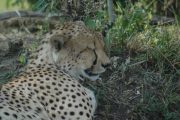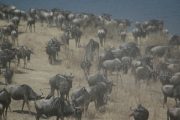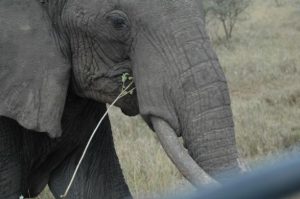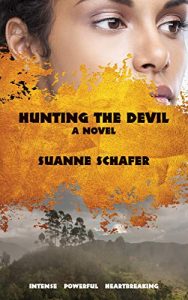The Writing of Hunting the Devil
When I decided to celebrate my sixtieth birthday in Africa, I didn’t realize the culmination of my life-long love affair with Tarzan would result in my book Hunting the Devil. As I made plans, I asked my son if he’d accompany me, and he replied with the ultimate teenage endorsement: “I guess so.” With this resounding approval, I tracked down a safari outfit to take us on a private safari. I’d photograph exotic wildlife while my interracial son had vague hopes of connecting with his black roots.
 After a thirty-one-hour flight, we touched down at Kilimanjaro Airport. On the road from the airport to Arusha, we saw our first wild animal almost invisible in the darkness—a giraffe at the edge of the road. Oddly, it didn’t budge as we drove past.
After a thirty-one-hour flight, we touched down at Kilimanjaro Airport. On the road from the airport to Arusha, we saw our first wild animal almost invisible in the darkness—a giraffe at the edge of the road. Oddly, it didn’t budge as we drove past.
The giraffe turned out to be a roadside attraction, a wooden cut-out only a few inches deep. That advertising phenomenon should have warned us that on this trip things might not be what they seemed.
 The next afternoon, as we stared down from our puddle-jumper to the Serengeti, long-legged giraffes—real ones—galloped across the savannah in National Geographic formation.
The next afternoon, as we stared down from our puddle-jumper to the Serengeti, long-legged giraffes—real ones—galloped across the savannah in National Geographic formation.
Elephants looked like chess pieces used by unseen celestial opponents. The bullseyes of Maasai villages dotted the landscape. Their outer thorn-circles defended the huts from predators, the next protected livestock, and the innermost safeguarded the youngest animals.
Immediately I found comfort in the Serengeti. Its wide-open savannas resembled the plains of West Texas where I grew up. Wind tumbled clouds across a white-blue sky before whistling through flat-topped trees and twirling red volcanic earth into dust devils. Wildebeest roamed like the Texas longhorns or bison. Jackals and hyenas replaced coyotes. The utter silence of the Serengeti was a delight. No cell phones. No TV. No traffic. No beeper going off.
 After a few days of nonstop safari, my son’s attention span drooped. Withdrawal from all things electronic rattled his composure. He wanted all the things I didn’t: cell phones, texting, TV, video games. Eventually, he only perked up at life-threatening moments—like when an elephant charged us.
After a few days of nonstop safari, my son’s attention span drooped. Withdrawal from all things electronic rattled his composure. He wanted all the things I didn’t: cell phones, texting, TV, video games. Eventually, he only perked up at life-threatening moments—like when an elephant charged us.
From the Serengeti, we followed wash-boarded roads to the most important archaeological site in the world, the Olduvai Gorge. Standing where Louis B. Leakey made history-shattering discoveries, I realized eons of human history lay buried in the geologic strata beneath my feet.
My son and I, black and white, genetically different yet nearly genetically identical, were bound by an endless double helix stretching through millenia. An immense connection with the earth and our ancestors suffused my consciousness. The experience was so profound recalling it now, I get teary-eyed.
 Despite my heartfelt reaction to Olduvai, my son was nonplussed. His hopes of discovering his black heritage proved elusive. “Mom, I’m not black enough” became his refrain. In Tanzania, because he was interracial, he was considered white. In the States, he’d always been overshadowed by eighty-eight percent of Americans that are white. He calls himself an Oreo, black on the outside but white on the inside.
Despite my heartfelt reaction to Olduvai, my son was nonplussed. His hopes of discovering his black heritage proved elusive. “Mom, I’m not black enough” became his refrain. In Tanzania, because he was interracial, he was considered white. In the States, he’d always been overshadowed by eighty-eight percent of Americans that are white. He calls himself an Oreo, black on the outside but white on the inside.
In Tanzania, he fit in visually with the majority, but because he was biracial and traveling with a white woman, the locals considered him white.
He’d only experienced segregation from watching TV documentaries and stories I’d told him about growing up with separate toilet facilities. We’d had one blatant racial attack when he was too young to remember, and in our liberal circle of friends, he remained relatively sheltered from bigotry. He said, “I thought with all the blacks there, I’d belong, but I didn’t. It just felt weird being white. Like I was a ‘reverse Oreo,’ white on the outside, black in the middle.” Neither of us had anticipated the reverse discrimination issues or his reaction to them.
These experiences led to my writing Hunting the Devil. My protagonist, Dr. Jessica Hemings, started as the heroine-physician in a lion shape-shifter novel. I never went anywhere with that story, mostly because I felt the female protagonist and the African setting were too good to “waste” in a paranormal romance.
Taking my son’s discomfort in Tanzania and blending in my experiences as a physician working in medically under-served areas, I made Jessica Hemings biracial and gave her ambivalent feelings about race. When Jessica volunteers for a medical mission in Rwanda, she becomes entrapped in the maelstrom of Rwandan politics and the enmity between Hutus and Tutsis.
Her Tutsi features drawn her into the wrong side of the Rwandan Genocide. Dr. Cyprien Gatera, Jess’s superior and a Hutu radical, commandeers her clinic, slaughters her patients and her adopted sons, then forces her to treat his wounded. She escapes and survives three weeks in hiding in Rwanda’s mountains before finding refuge at Benaco refugee camp in Tanzania.
There, Jess vows revenge. When an unknown informant passes information to her about her nemesis, she returns to Rwanda, despite warnings from the Belgian Secret Service that Gatera plans to assassinate her. In their final showdown, Jess must decide if revenge is best served cold—or not at all.
To recreate 1994 Rwanda, I read thirty books in addition to the sixty I’d read to prepare for my safari. Many of that second batch of books were first-hand accounts like The Men Who Killed me: Rwandan Survivors of Sexual Violence edited by Anne-Marie de Brouwer and Sandra Ka Hon Chu and Shake Hands with the Devil: The Failure of Humanity in Rwanda by Roméo Dallaire, commander of UNAMIR (the United Nations Assistance Mission for Rwanda).
All this research made me acutely aware of how little the world valued Rwandan lives—in the United States, the Nancy Kerrigan/Tanya Harding debacle and O.J. Simpson’s murder rap got more coverage than the genocide. The genocide in Serbia had occurred only months before yet received much more attention and United Nations intervention. I found it difficult to “live” in Rwanda for over two years, then I revisited the horrors through four rounds of edits/proofreading. But I am relieved to finally be emotionally out of the country.
A gut-wrenching novel of a doctor pushed to her limits, Hunting the Devil also looks at tough situations: genocide, war crimes, racial issues, poverty and lack of health care, graft and corruption. Part medical procedural, part global political thriller, part justice-seeking novel, and part fractured romance, the book is a genre-breaker. Though I didn’t start out planning a “message book,” Hunting the Devil became just that—disguised as an action thriller for women. It’s a book I hope will challenge people. Those who’ve read it say it’s a page-turner. They can’t put it down, yet it stirred their emotions deeply.
Here is the link to the video trailer for Hunting the Devil. It recently won the Best Commercial by Top Shorts and was one of the jury’s Top Fifty Films.
https://www.youtube.com/watch?v=uF1rjKomAJU
All photos ©Suanne Schafer
—
Suanne Schafer, born in West Texas at the height of the Cold War, finds it ironic that grade school drills for tornadoes and nuclear war were the same: hide beneath your desk and kiss your rear-end goodbye. Now a retired family-practice physician whose only child has fledged the nest, her pioneer ancestors and world travels fuel her imagination.
She originally planned to write romances, but either as a consequence of a series of failed relationships or a genetic distrust of happily-ever-after, her heroines are strong women who battle tough environments and intersect with men who might—or might not—love them.
Suanne completed the Stanford University Creative Writing Certificate program. Her short works have been featured in print and on-line magazines (Bête Noire; Brain, Child; Empty Sink Publishing; and Three Line Poetry) and anthologies: (Night Lights; Graveyard; 166 Palms; and Licked). Her debut women’s fiction novel, A Different Kind of Fire, explores the life of Ruby Schmidt, a nineteenth century artist who escapes—and returns—to West Texas. Suanne’s next book, Hunting the Devil, explores the heartbreak and healing of an American physician caught up in the 1994 Rwandan genocide.
Follow her on Twitter https://twitter.com/SuanneSchafer
Find out more about her on her website https://suanneschaferauthor.com/
HUNTING THE DEVIL, Suanne Schafer
 When Dr. Jessica Hemings volunteers for a medical mission in Rwanda, she becomes entrapped in the maelstrom of Rwandan politics and the enmity between Hutus and Tutsis. Her Tutsi features plunge her into the Rwandan Genocide. Dr. Cyprien Gatera, Jess’s superior and a Hutu radical, commandeers her clinic, slaughters her patients and her adopted sons, then forces her to treat his wounded. She escapes and survives three weeks in hiding before finding refuge at Benaco refugee camp in Tanzania.
When Dr. Jessica Hemings volunteers for a medical mission in Rwanda, she becomes entrapped in the maelstrom of Rwandan politics and the enmity between Hutus and Tutsis. Her Tutsi features plunge her into the Rwandan Genocide. Dr. Cyprien Gatera, Jess’s superior and a Hutu radical, commandeers her clinic, slaughters her patients and her adopted sons, then forces her to treat his wounded. She escapes and survives three weeks in hiding before finding refuge at Benaco refugee camp in Tanzania.
There, Jess vows revenge. She searches for Gatera with the help of Michel Fournier, a French lawyer-turned-war-correspondent, and Dr. Tom Powell, her long-time lover. When an unknown informant passes information to Jess about her nemesis, she returns to Rwanda, despite warnings from the Belgian Secret Service that Gatera plans to assassinate her. In their final showdown, Jess must decide if revenge is best served cold—or not at all.
Vivid, boldly written, life-affirming historical fiction drawn from the horrors of the Rwandan genocide crisis. –Kirkus Reviews
The author writes so convincingly that the book can pass as an eyewitness account of the Rwanda genocide. –Online Book Club
Readers seeking a fast-paced story of confrontation, capture, freedom and revenge will find the action swift and the background realistically compelling in Hunting the Devil, but its main attraction lies in an ability to educate readers about African politics, social struggle, and perceptions. –Midwest Book Reviews
[Hunting the Devil] took my love of history, my love of romance, adventure and action and rolled it into one. It was an emotional read which proves how skilled the author really is. –International Review of Books
BUY THE BOOK HERE
Category: Contemporary Women Writers, On Writing































Fascinating. I’ve always wanted to visit Africa and I would enjoy learning from your book. I thought I’d share with you that I have 2 wonderful adopted biracial sons, who are now successful young men. In our CONSERVATIVE circle of friends and family they have experienced only love and , no bigotry. All the best to you!